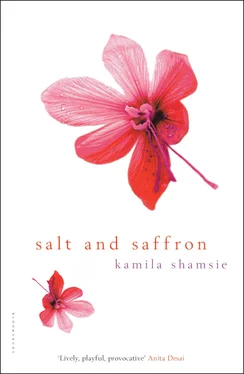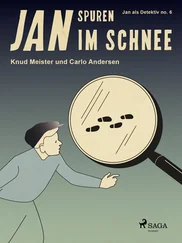‘Be more considerate of your feet,’ Baji said. Had I managed to sleep just a little on the flight from Boston I might have held out for something more gracious, but the situation being what it was I sank into an armchair.
‘So,’ Baji said. ‘How is your dadi?’
I looked at Samia, who whisked a penknife out of Baji’s reach. Very reassuring.
‘Oh, Dadi,’ I said, waving my hands vaguely. ‘You know.’
‘No, I don’t. I haven’t seen her since Partition.’
‘Oh, that’s right. Partition.’ I wondered if ripping off my clothes and doing the bhangra would help steer this conversation towards less disastrous paths. ‘Not a lot of interesting words that rhyme with Partition. I wanted to write a ghazal, in English, for a class. With Partition as the rhyme. Partition. Ma’s mission. Pa’s wishin’. Turns into a country and western song. Allowing for half-rhymes isn’t too rewarding either. Partition. Fruition. Revision. Condition.’
‘Division,’ Baji said.
‘Mauritian,’ said Samia, and saved the day.
Baji leant back against the cushions and smiled at me, not altogether pleasantly. ‘For Samia’s sake, I won’t say anything else on the subject. Except that if you ever write a poem about Partition, it must be a lament.’
‘A ghazal,’ I said, determined not to back down before her. ‘It was to be a ghazal. And one of the reasons I love ghazals is that the mood can change entirely from one couplet to the next. Isn’t that how it always is? One person’s lament can be someone else’s elegy.’ Masood once told me that his grandmother walked over a hundred miles to reach Pakistan in August 1947, and when she arrived in her new homeland she fell to her knees and kissed the ground so repeatedly that the dust of Pakistan was permanently lodged in her throat and for the rest of her life she could not breathe deeply without coughing. When, years later, a doctor said he could cure her of the cough she threatened to break his legs. Who was Baji to imply that Masood’s grandmother’s story was not worth celebrating?
‘My brother died in a communal riot just after Partition. Your grandparents, and all those other Dard-e-Dils who leapt on to the Pakistan bandwagon, had left by then, were in Karachi; so my brother died in their place.’
‘In their place?’
‘He died for what they believed in.’
She was making it up. I knew that with utter certainty. None of the Dard-e-Dils died in the Partition riots; they either left for Pakistan in first-class style, with armed convoys or in the safety of aeroplanes, or they stayed within the four walls of the palace in Muslim-majority Dard-e-Dil until the worst of the troubles died down.
‘He was my half-brother,’ Baji said, very softly. ‘We had different fathers. I hardly ever spoke to him. He was not royal, you see. He was not too grand to be killed in something as common as a riot.’
Why weren’t any of the windows open? I could barely breathe.
The doorbell rang and even Baji looked relieved by the interruption. Stinky (or was it Smelly) charged out of his room and into the drawing room, leapt over one table, rolled under another, somersaulted over a third, unlocked the front door and leapt, rolled, flipped back into his room before the bellringer had quite finished entering the flat.
‘Rehana Apa!’ Samia kissed the newcomer — a younger version of Baji, but with hair halfway down her back. Her elbows were quite ordinary.
‘My granddaughter,’ Baji said to me. And then to Rehana, ‘This is Aliya.’ Rehana Apa smiled at me, a lovely smile, and embraced me.
‘These cousinly demonstrations can wait until later,’ Baji said. ‘Rehana, why don’t you bring it out?’
It? I thought. Tea?
‘Can I help?’ I said.
‘Not if the past is anything to go by,’ was Baji’s response.
Samia seemed as mystified by this as I was. We sat back in our chairs as Rehana Apa exited the room, and Samia started to talk to Baji about the difficulty of getting saris dry-cleaned in London. I tried to understand why I felt such hostility towards this woman whom I’d never before met. Because she hadn’t greeted me with open arms? I was usually adept at receiving coldness with indifference. Why should she bother me so much, when I knew nothing about her except for that matter of the elbows (and it couldn’t be that because I had no such animosity towards her granddaughter, who had provoked in me only feelings of warmth in the few seconds she’d been in the room)? So what else was there? She’s liable to start ranting at the mere mention of my grandmother’s name. Surely, surely, if anything, that should create a feeling of affinity between us. I’d done my fair share of ranting about Dadi in the last few years. Even as I thought that, I remembered Samia saying Baji blamed Dadi for the family split after Partition, and my face flushed with rage. How dare she? ‘We were girls together,’ Dadi had cried when she missed the chance to meet the mysterious Prufrock relative from India. She had cried. Slipped down on to the marble floor … My Dadi sat on that cold, hard floor and though I was only a child I knew the tears she was weeping were old, old tears.
I felt tears forming in my own eyes, so to distract myself I looked around at the framed photographs cluttering the walls and tables. A few of them were in colour, but by and large they were black and white and, here and there, sepia. Baji was still talking to Samia, but as my eyes wandered in her direction she extended a hand and pointed at a picture on the wall. I got up and walked over to it.
The setting was the grounds of the Dard-e-Dil palace. I recognized it instantly from the photographs and paintings that adorned the walls of Dadi’s house in Karachi, recognized it well enough to know that to have snapped that particular vista the photographer must have been backed up against the marble statue of Nur-ul-Jahan, founder of the house of Dard-e-Dil. Behind the figures who posed in the foreground was the arched entryway to the verandah that led to the part of the palace where Dadi’s immediate family lived. Her father, though related to the Nawab only through marriage, had the prized ability to make the Nawab laugh and, as such, was indispensable at court. Officially, he was a minister, but it seems to me he came closer to fulfilling the role of court jester. My other great-grandfather, the courtier-cum-yak-enthusiast, was somewhat more independent (or less favoured) and lived away from the palace. But not so very independent, or so very out of favour; if the photographer had angled his camera up, say, thirty degrees he would have captured that spot on the palace roof where you could stand and look through a gap in the trees to see the house where the yak-man and his wife raised the triplets, just outside the palace walls. (‘House’ is the word Dadi uses to describe the triplets’ home, but within the boundary walls there were stables, a mosque, and fruit orchards, to name just a few accessories to the ‘house’.)
All this I registered when I looked at the picture, but only to the extent that you might register the details of a frame when looking at the ‘Mona Lisa’. My real interest was in the three boys and the girl who were the reason for the photograph. My first thought when I saw the brothers was how strange it was that I had never before seen a picture of all three of them together. Their arms around each other’s shoulders, they stood so close they could have been Siamese triplets in sherwanis, their necks rising dark from the high white collars, their hair identically parted and slicked down. Abida — she was too young in the photograph for me to think of her as Dadi — stood in front of her three cousins, swaying back just enough to make it impossible to discern from the lens angle whether or not she was leaning against the middle brother’s chest. But whose smile was that on Abida’s face? Not Dadi’s, certainly not. The peculiar expression, ‘her face spilling over with laughter’, made sense for the first time as I looked at that teenaged girl, her back arching towards the impossibly beautiful boy in the centre of the photograph.
Читать дальше












